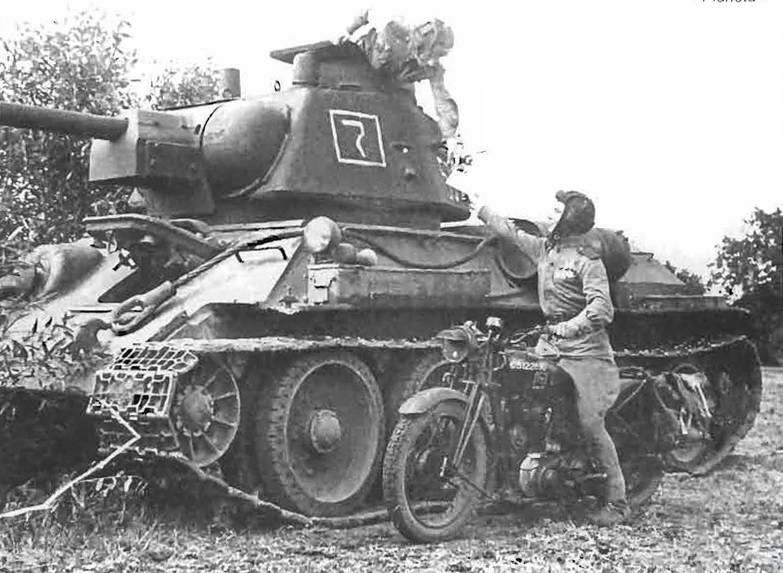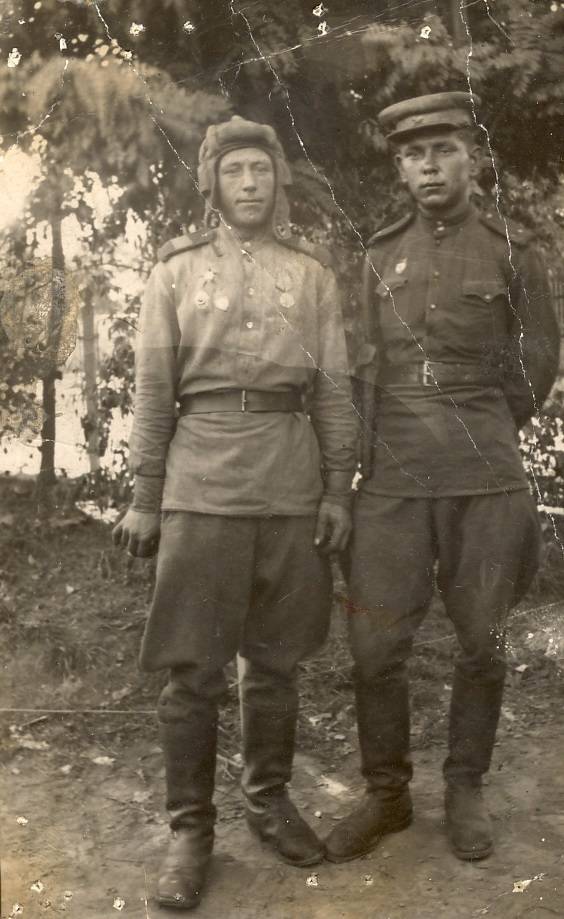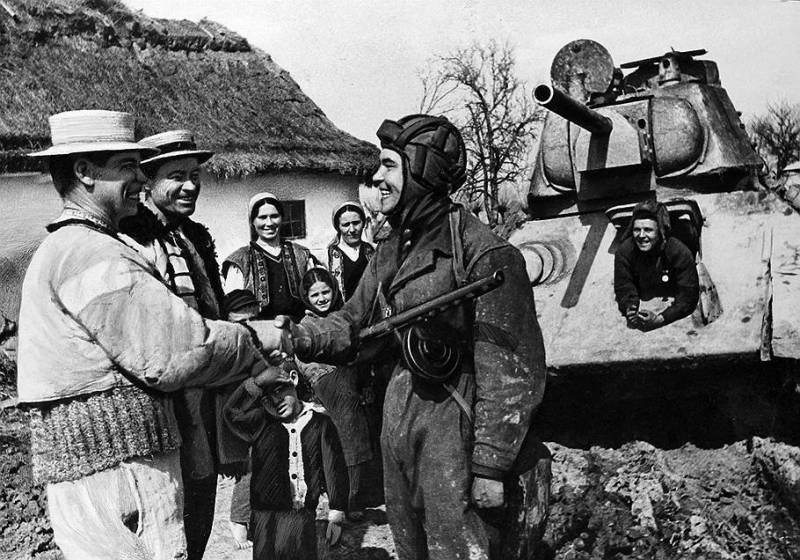The mountains will tell. Tank battle of Sergeant Andreyanov
In the pre-autumn Carpathians, dawn broke out. Near the clouds, the mountains met the sun. They lit up bronze, as if bonfires were being made on their humpbacked peaks. And only in the gloom of the forests, tightly embracing the sloping shoulders of the spurs, there were untouched shadows. The fog, which was present in their sleepy immobility, slowly drifted down into the valley, covered the winding channel of the Prut in thin and transparent layers, swaddled the Minzhir farmstead up to the roofs, which became remarkable because from it, in the language of the military, the forcing of another water line began, which still outlined itself a piece of land not liberated from the enemy.
If yesterday the gray expanse of the river carried a mysterious unknown, today from the farm up and down the river one could clearly see firmly knocked together ferries, rafts crowded along the left bank, and light boats and boats that had appeared from nowhere.
The majesty of the hills, forests and valleys, unaccustomed to the Volzhan Andreyanov, lined with smooth trellises of ripening vineyards, rested in the pre-dawn silence, not knowing that from minute to minute there would come a confused awakening caused by the beginning of the battle.
Not having the strength to overcome fatigue and calm the quivering tremors in the whole body, Sergeant Andreyanov fell to the ground, all soiled by the carbonaceous holes of the extinguished flame. Leaned my shoulder against the sparkling caterpillar tank, the cast shell of which, without leaving a living place, was deeply excised and scratched today by the oncoming bullets and shell fragments. With a long glance, he looked over from the hillock a strip of land that had just been beaten off from the Germans, almost cut in two by the Prut channel, and was surprised at how small it was, although the battle for it raged furiously from dawn to sunset. I thought that the village of Minzhir is among many who have not escaped a similar fate. And the losses in subunits not yet taken into account by the headquarters will increase the mournful score of the war.
Many such villages as Minzhir were seen on his way by the driver-mechanic Andreyanov during the annoyingly offensive time of retreat, and then during the years of all-crushing exile from the land occupied and tormented by the enemy's violence. Liberating the charred villages and settlements, crushed into the rubble of the city, he himself, like his tank, was in scars and burns. In one of the battles, he was barely alive pulled out of a burning tank, he healed two severe wounds in hospitals.
... By the end of the sultry and dusty summer of 1944, the war had already crossed the state border and unstoppably made its way to the enemy's lair - Berlin. And, only slightly lagging behind with its left wing, the front loomed over the swift Prut and lingered just long enough to pull up the rear and gather strength for a new throw.
Before the tankers of the 37th Guards. TP 15 Guards. The mbr was assigned a combat mission: at dawn, after heavy shelling, in a swift throw in three columns, according to the number of crossings, from the Minzhir farm to break through the enemy's defenses across the river. By any means to squeeze into its rear, to disorganize and suppress the depth of the enemy defense with a high-speed maneuver, and in cooperation with other branches of the armed forces to clear a bridgehead for the main forces of the offensive.

The T-34-76 tank belongs to the 13th Guards. mbr 4th guards. MK, 3rd Ukrainian Front, late summer 1944
In the evening, the commander of the thirty-four regiment, having selected the best crews for the assault group, clarified the details of the operation with the tank commanders.
A night full of hassle and stress was spent on the combat equipment of the vehicles. Sergeant Andreyanov literally felt every bolt, every nut, ran the engine in different modes. From the experience of his comrades, and from his personal examples, he knew that any mistake, even the most insignificant, could turn into an irreparable disaster in an attack.
At the time scheduled for the attack, after a soldierly short half-sleep, the crew executed the readiness command and waited for the signal to attack.
From somewhere from the skyscrapers, guns rumbled, as if from behind, almost knocking down the tops of the flimsy beeches, humpbacked attack aircraft escaped. The ground on the opposite bank of the Prut started to smoke, caught fire, flamed.
The depopulated and doomed little hamlet of Minzhir, caught between two fires, seized fire from the far end and devoured it predatory until it was full of the last hut. It was the German positions that responded to rapid fire from our side with no less powerful artillery volleys. True, they did not reach the tanks hiding in the forest, but they hit the crossing thoroughly. The left floating bridge was torn in half, and its two halves were flattened by a strong current along the steep banks. In several places, the wooden flooring of the middle thread was turned into chips by a direct hit, and the right one, torn off at the opposite bank, was led to the rod of the Prut.
As it turned out, the situation was not in favor of the advancing army. The tank attack was thwarted.
The sappers were the most annoying. One had only to imagine how much effort it cost them to lay the threads of the crossing, how many boards and logs they dragged on their shoulders, hammered in nails, fastening brackets! Everything went to pieces! They began to scold both the gunners and aviators: they missed, they say, the right moment, that, they say, they made a mistake.
The attack had to be postponed. The bridges began to be rebuilt before dark under the powerful umbrella of attack aircraft and fighters. The Germans, as they say, were literally not allowed to raise their heads. By dawn the next day, the crossing was ready.
It was then that the command signaled to attack.
With a crunch tearing apart the juniper bushes, shaking off the dew that had cooled during the night, the dark green bulk of the tank rolled onto the open slope and, holding back its run, clanged along the wooden deck of the floating bridge. Andreyanov drove his car in front of the column and therefore realized how important it was for himself and for the following crews to safely overcome the crossing created by the hands of sappers and feel the earthly firmament under the bracelets of the caterpillars.
Finally, here it is, and the tank roared towards the village, half engulfed in flames. Placing over the undersized bushes in the thinning fog, the machine driven by Andreyanov was far away from the general formation. And immediately red and black sultans rushed up near her. It was the German battery that came to life. The tank cut off the corner abruptly, defiantly diverting the attention of the enemy artillery. He repeated a similar maneuver near the village itself and immediately disappeared behind its houses, which did not have time to reach the fire. Meanwhile, other attacking tanks rolled into enemy lines, blazing blades of fire, wiping the Germans into the second echelon of the defensive line. Here, a bloody battle began to grow tight and was gaining momentum.
The Andreyanovsky tank was operating at the other end of the farm. Making his way from the flank to the rear of the German defense, he completely unexpectedly stumbled upon vehicles camouflaged in the gardens, prepared, possibly, for the removal of staff documents and the evacuation of senior officers. Having shot at point-blank range, the tank left behind hot-burning cars. At close range, he demolished an armored car, which was moving away. In pursuit of the second armored vehicle, the tank, taking advantage of the confusion that had begun, burst into the rear of the enemy. Having completely seized the initiative, our assault detachments widened the gap, pushing the enemy deep into the defenses, giving wide scope to the infantry, which was firmly biting into the ground.
The thirty-four, which became the object of close observation from the command post, with all the power of fire crushed the enemy's rear, with the load of its multi-ton corps pressing the charred and twisted guns into the ground, watering the panicked Germans with lead. Neither the threats of the officers, nor the shouts breaking down to a nervous squeal could stop the panicky flight. Those who were still able to mobilize their strength and maintain self-control fled, trying to find shelter. Well, those who lost faith in "God's salvation" threw weapon and surrendered.
From an unsent letter from a German soldier who died on the banks of the Prut.
Neither the mechanic himself nor his comrades could say how much strength was given for each inch of land. But with the same dexterity, he continued to take the car away from the blows, hide it in the hollows, at the right moment open just enough to have time to hit the target and take cover again. Following the tanks, our troops were drawn into the depths of the bridgehead by an indestructible avalanche. By the end of the day on August 24, the troops of the 2nd Ukrainian Front reached the Prut River and cut off all enemy troops' escape routes to the west and southwest. The advanced tank units of the 3rd Ukrainian Front established direct contact with the troops of the 2nd Ukrainian Front. 2nd and 3rd Ukrainian fronts merged. The encirclement of the German group, which entered the history as the seventh Stalinist strike, the Jassy-Kishinev offensive operation.
In the evening, withdrawn from the battle, the assault group of thirty-fours received a rest. Sitting at the edge of a beech grove, in black smoked overalls, the tankers were smoking cigarettes and noisily discussing the episodes of the battle. More often than others, the name of the driver-mechanic Vasily Dmitrievich Andreyanov was mentioned in conversations, who today distinguished himself by the art of maneuver, personal initiative and outstanding courage.
But all this was somehow interrupted by the thought of the war and why the Germans came as enemies to our land, why did they need to destroy other people's cities and houses, to kill people? The whole world stopped, straining efforts for war: it built in order to destroy, destroyed in order to build. And what came of this? It turned out that the Germans never saw themselves as victors. Before my eyes stood Fritz, Hans, Karl, or whatever he saw in the viewing strip today. Like a child, clutching the dull cigar of a shell to his chest, raking the sand with the heels of his boots, he backed up to the anti-tank gun. Resting his back on the edge of the curved shield, he frightenedly dropped the shell from his hands and slowly began to raise them up. Under the helmet, an elderly face petrified with horror and distraught eyes. Sounds escaped from the gap in the mouth. Which ones, Andreyanov did not hear. Probably begged God for mercy and salvation.
It never happened to Andreyanov to see human fear so closely. And then even a lump came up to his throat: it was no longer a warrior standing in front of him. Vasily abruptly laid siege to the formidable machine and, allowing the German to step aside, with a dull grinding he fell on the cannon, which groaned under the elastic bottom of the thirty-four.
Having resolutely driven away from himself the nightmares of today's battle, Andreyanov sprung to his feet. I straightened my jumpsuit with the usual movement of my hands. In a businesslike manner, he examined the car, worn out and in deep abrasions, turned his eyes to the age-old trees, which covered the temporarily outstretched tents with their heroic hats.
Dusk was approaching, and the war, weary in military vigils, was preparing for a short and alarming oblivion. And only the mountains, as if they could not say goodbye to the sun, without telling him the story of the courage of their liberators.
Andreyanov Vasily Dmitrievich - was born on July 21, 1915 in the village of Tashla, Stavropol region in a large peasant family. Before serving in the army, he worked on a collective farm. In 1936, the Stavropol RVK was called up to serve in the Red Army. He served in the Khabarovsk Territory, took part in the battles with Japan on Lake Khasan in 1938, was awarded the badge "Participant of the Khasan Battles".
In June 1941, the Khabarovsk GVK was again called up to mobilize for the Great Patriotic War. Senior sergeant, driver-mechanic of the T-34 tank of the 37th tank regiment of the 15th mechanized brigade of the 4th mechanized corps fought on the southern, Stalingrad fronts. In March 1942 he was wounded. After the hospital, he took part in fierce battles near Stalingrad. Vasily Dmitrievich especially distinguished himself in the Yassy-Kishinev strategic offensive operation.

Andreyanov Vasily Dmitrievich (pictured: left), May 1944
- from performance to the title of Hero of the Soviet Union.
Died 13 June 1953 year.
Awards: Order of Lenin and "Gold Star" of the Hero of the Soviet Union, Order of the Red Star, Medal "For Military Merit".
- Petrov Sergey (bubalik)
- http://победныймай.рф/node/3690 http://tankfront.ru/ussr/photo/gvmk04.html#!prettyphoto[gallery1]/22/ https://tunnel.ru/tmp/n8x9ZlqETcuGyQPbfsek/xwk3qajarvu.jpg

Information